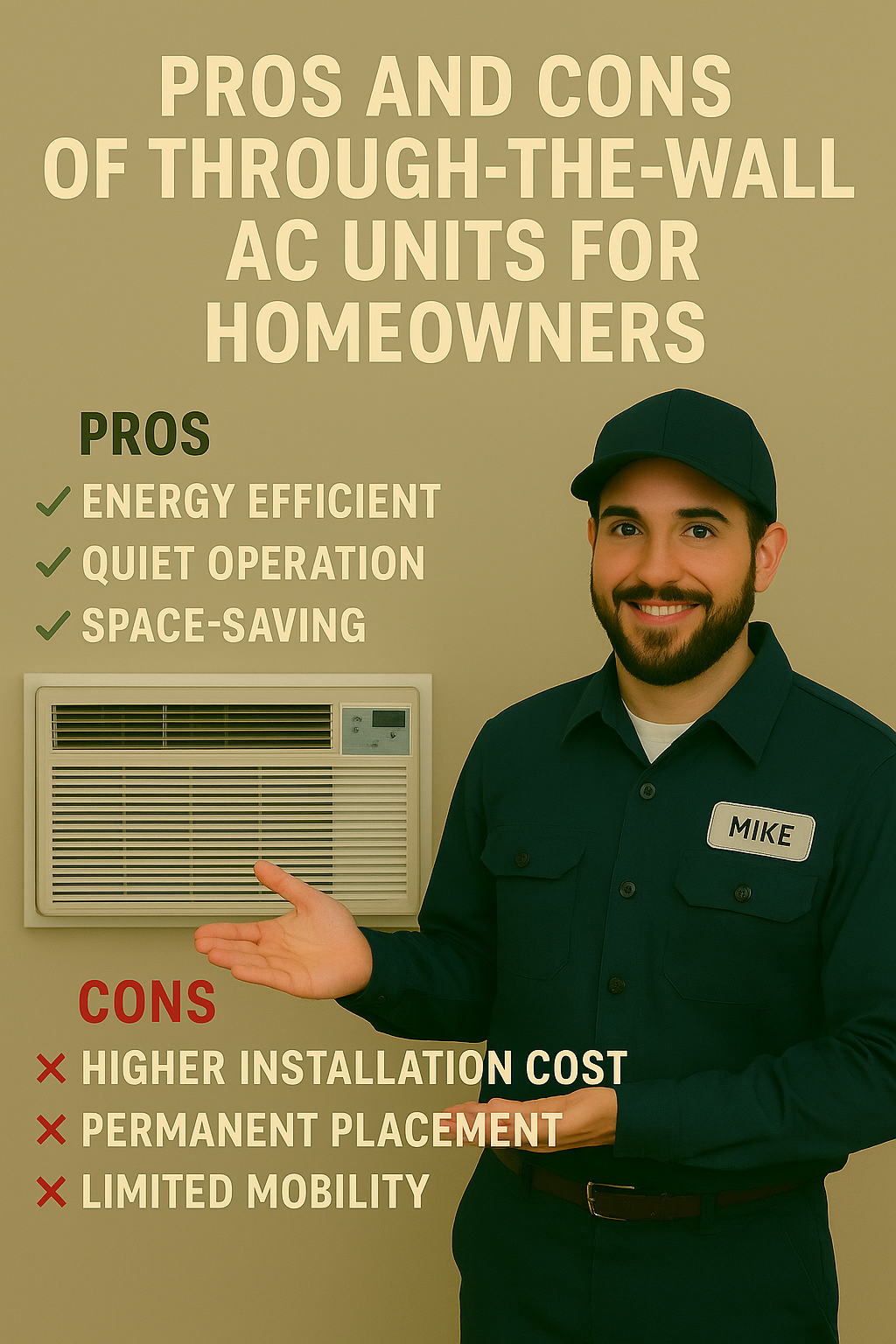📘 Table of Contents
-
🏠 Introduction to Wall AC Units
-
🧱 Pros of Through the Wall Air Conditioners
-
⚠️ Cons Every Homeowner Should Know
-
🛠 Tips for Getting the Most Out of a Wall Unit
-
✅ Key Takeaways and Next Steps
-
❓ FAQ
🏠 Introduction to Wall AC Units
Through-the-wall air conditioners offer a sleek, semi-permanent cooling solution that’s ideal for homeowners seeking something quieter and more secure than a window unit. These systems mount flush into an exterior wall, freeing up your windows and often running more efficiently.
But are they right for your space? In this guide, we’ll walk through both the upsides and the limitations so you can make the best choice for your home.
🧱 Pros of Through the Wall Air Conditioners
Before jumping into installation, it’s good to know why so many homeowners opt for wall-mounted ACs. These units offer a range of long-term advantages:
-
Better Energy Efficiency: Wall units are built into a sleeve and surrounded by insulation, which reduces air leaks. Many models meet Energy Star guidelines.
-
Quieter Operation: Since the compressor sits farther from your living space and the unit is insulated, noise is noticeably reduced compared to window models.
-
Unobstructed Views and Natural Light: With your window left untouched, you retain natural light and avoid blocking emergency exits.
-
Improved Security: Wall units are harder to tamper with than window-mounted ones, reducing break-in risks.
-
Permanent Installation: They’re ideal for homeowners looking for a low-maintenance, built-in cooling solution that won’t be removed seasonally.
🧊 Need the right model? Browse AC units and AC Handler systems at The Furnace Outlet.
⚠️ Cons Every Homeowner Should Know
No system is perfect, and wall units come with a few notable downsides. Knowing these upfront can save you time and money:
-
Installation Involves Wall Modification: You’ll need to cut a hole in your exterior wall, which could require permits and usually demands professional help.
-
Higher Upfront Costs: The units themselves typically cost more than window models, and the installation can drive up the total cost.
-
Lack of Portability: Once it’s installed, that’s its permanent spot—moving it means patching the wall and reinstalling elsewhere.
-
Potential Air Leaks if Improperly Installed: Without proper sealing, you may still experience air loss or reduced energy performance.
🛠 Tips for Getting the Most Out of a Wall Unit
If you’re going with a through-the-wall unit, here are some tips to ensure you get peak performance year-round:
-
Use the Right Sleeve: Always match your unit with a properly sized sleeve to reduce vibrations and ensure stability. Home Depot has a helpful sleeve sizing guide.
-
Seal All Gaps: Use foam insulation or caulking around the sleeve to prevent air leakage and maintain efficiency.
-
Upgrade to a Smart Thermostat: Wi-Fi-enabled thermostats help you control your wall unit remotely for smarter energy use.
-
Clean or Replace Filters Monthly: This improves airflow, indoor air quality, and system longevity.
🧼 Need supplies? Visit our collection of accessories and parts.
✅ Key Takeaways and Next Steps
Through-the-wall ACs are ideal for homeowners who want a reliable, quiet, and secure cooling solution, but they require upfront planning and investment. Here's a quick summary:
-
Ideal for long-term use and aesthetic integration
-
Quieter and more efficient than many window units
-
Installation requires time, money, and sometimes permits
-
Be sure to seal and maintain the unit regularly for best performance
🔙 Back to Main Topic: Through-the-Wall AC vs Window Unit
➡️ Next: Why Window AC Units Are Still a Popular Cooling Choice
❓ FAQ
Q: Do I need a permit to install a wall AC unit?
A: In many areas, yes. Cutting into an exterior wall may require a permit, especially if it’s a load-bearing structure. Check with your local building department.
Q: Can I install a wall unit myself?
A: It’s possible, but not recommended unless you’re confident in cutting, framing, and sealing. For safety and efficiency, hiring a pro is best.
Q: What’s the average lifespan of a wall AC?
A: With proper maintenance, most through-the-wall units last 10–15 years. Keep it clean and sealed for the longest service life.
Q: How do I winterize a wall AC unit?
A: Use an insulated cover on the inside or outside of the unit to prevent drafts. You can also remove and store some models if designed for seasonal use. The Spruce has a good winter prep guide.
Q: Are wall AC units energy efficient?
A: Yes, especially newer models with Energy Star certification. Proper installation and regular maintenance make a big difference in energy savings.







